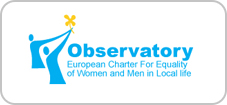Home /
News /
In-depth news /
Gender equality
next > < previous

Equality of women and men in local life

Gender equality - 08.03.2023
International Women's Day: Let’s talk about human rights!
Dr. Claudia Schöning-Kalender, Member of the SPD-parliamentary group in Mannheim City Council (Germany), Chair of the CEMR Standing Committee for Equality, calls on EU institutions to “effectively translate words into action” on gender equality.
Women feature prominently in Greek mythology as heroines, goddesses, and warriors. The reality for them in ancient Greece was that they had few rights and were largely deprived of political voice and agency. This incongruity doesn’t prevent ancient Athens being frequently cited as the cradle of democratic societies despite the lack of equal rights and representation for half of its people. Throughout history women have been considered as second-class citizens and even denied their humanity.
Times have changed since Ancient Greece, but it would be mistaken to think that development for the better is straightforward or linear. Europe has been through terrible wars and progress is frequently punctuated by setbacks in social and political life. This is sadly true for women’s rights as well.
In the course of history, we also witness that there is no unique development in all nation states. Have a look at Switzerland: towards the end of 19th century, it was the country where ambitious women went to study and obtain university degrees. Despite being a safe haven for women searching to gain knowledge, women’s full suffrage was granted in Switzerland only in 1971. That is almost 80 years after New-Zealand, 65 years after Finland and 50 years after many current EU Member States.
Looking at history helps to understand that the development of women’s rights in our European countries doesn’t follow a simple logic of always getting better in terms of more acceptance and more equal rights. It happens in some fields and it doesn’t in others. And this is not only true when looking at Switzerland’s history, it goes for all European countries.
We have come a long and successful way in many countries in terms of equal rights for men and women in Europe, including political rights. But it is only quite recently that the disparity between women and men in decision-making has come to be viewed as a challenge to democracy. At the close of the UN’s first world conference on women in Mexico in 1975, a then adopted action plan stated that the increased and equal participation of women at all levels of decision-making would speed up development and foster peace.
It took the international community another 20 years to assert the fact that women’s rights were an integral part of human rights and to promote specific actions accordingly to ensure respect for these rights. That was done in 1995 at the 4th world conference on women held in Beijing.
Two decades later, UN Member States committed to Sustainable Development Goal 5 “Achieve gender equality and empower all women and girls”, a dedicated objective among the 17 SDGs to be achieved by 2030, as well as a cross-cutting thread underpinning all these Global Goals.
Equality at risk
Unfortunately, challenges and catastrophes put equality and human rights at risk. In situations of disaster and war, such as the current war in Ukraine or the recent devastating earthquakes in Syria and Turkey, the burden of keeping life going on overwhelmingly falls on women. It is mainly them who protect and feed their families, serving their communities. How is it then that they are so easily overlooked, abandoned and abused, in such circumstances?
Added to the exploitation and sexual violence perpetrated against women in crisis and conflict situations, there is an astounding lack of awareness of their hygienic, reproductive and child care needs. To address these challenges in an effective and sustainable manner, it is imperative that women’s voices are heard and that women have an equal seat at the table. It is they who know what the stakes are and who can chart the proper course towards safety, peace and prosperity. That is not to say that the burden of righting the world’s wrongs is upon the shoulders of women, but that we cannot continue as we have for so long, neglecting the experience, expertise and potential of 50% of the population.
My question is: how can it be that in the European Union where nine in ten people think that promoting gender equality is important to ensure a fair and democratic society (Special Eurobarometer 465, 2017), it is not more effectively translated into action?
As local elected officials, we call for the swift adoption of the current proposal for a Directive combatting gender-based violence, decisive for European women, but also for the ones fleeing wars and disasters and founding refuge in our municipalities. We also count on MEPs to embrace these issues in their upcoming innovative humanitarian aid strategy, following new Chapter 39 of CEMR European Charter for Equality of women and men in local life.
As countless news articles show and we, as citizens, witness, it doesn’t matter if a woman is rich or poor, lesbian or straight, non-disabled or disabled, young or old, cis gender or trans, just being seen as or perceived as a woman exposes one to discrimination or be treated as less than human. Putting this to an end is a foremost duty of European governments and civil society organisations who refer to any democratic traditions in Europe. Athena or Aphrodite are maybe part of a fabled past, but all over the globe, their battles are not a myth.
This article was first published on Euractiv.
Image source: Unsplash
Women feature prominently in Greek mythology as heroines, goddesses, and warriors. The reality for them in ancient Greece was that they had few rights and were largely deprived of political voice and agency. This incongruity doesn’t prevent ancient Athens being frequently cited as the cradle of democratic societies despite the lack of equal rights and representation for half of its people. Throughout history women have been considered as second-class citizens and even denied their humanity.
Times have changed since Ancient Greece, but it would be mistaken to think that development for the better is straightforward or linear. Europe has been through terrible wars and progress is frequently punctuated by setbacks in social and political life. This is sadly true for women’s rights as well.
In the course of history, we also witness that there is no unique development in all nation states. Have a look at Switzerland: towards the end of 19th century, it was the country where ambitious women went to study and obtain university degrees. Despite being a safe haven for women searching to gain knowledge, women’s full suffrage was granted in Switzerland only in 1971. That is almost 80 years after New-Zealand, 65 years after Finland and 50 years after many current EU Member States.
Looking at history helps to understand that the development of women’s rights in our European countries doesn’t follow a simple logic of always getting better in terms of more acceptance and more equal rights. It happens in some fields and it doesn’t in others. And this is not only true when looking at Switzerland’s history, it goes for all European countries.
We have come a long and successful way in many countries in terms of equal rights for men and women in Europe, including political rights. But it is only quite recently that the disparity between women and men in decision-making has come to be viewed as a challenge to democracy. At the close of the UN’s first world conference on women in Mexico in 1975, a then adopted action plan stated that the increased and equal participation of women at all levels of decision-making would speed up development and foster peace.
It took the international community another 20 years to assert the fact that women’s rights were an integral part of human rights and to promote specific actions accordingly to ensure respect for these rights. That was done in 1995 at the 4th world conference on women held in Beijing.
Two decades later, UN Member States committed to Sustainable Development Goal 5 “Achieve gender equality and empower all women and girls”, a dedicated objective among the 17 SDGs to be achieved by 2030, as well as a cross-cutting thread underpinning all these Global Goals.
Equality at risk
Unfortunately, challenges and catastrophes put equality and human rights at risk. In situations of disaster and war, such as the current war in Ukraine or the recent devastating earthquakes in Syria and Turkey, the burden of keeping life going on overwhelmingly falls on women. It is mainly them who protect and feed their families, serving their communities. How is it then that they are so easily overlooked, abandoned and abused, in such circumstances?
Added to the exploitation and sexual violence perpetrated against women in crisis and conflict situations, there is an astounding lack of awareness of their hygienic, reproductive and child care needs. To address these challenges in an effective and sustainable manner, it is imperative that women’s voices are heard and that women have an equal seat at the table. It is they who know what the stakes are and who can chart the proper course towards safety, peace and prosperity. That is not to say that the burden of righting the world’s wrongs is upon the shoulders of women, but that we cannot continue as we have for so long, neglecting the experience, expertise and potential of 50% of the population.
My question is: how can it be that in the European Union where nine in ten people think that promoting gender equality is important to ensure a fair and democratic society (Special Eurobarometer 465, 2017), it is not more effectively translated into action?
As local elected officials, we call for the swift adoption of the current proposal for a Directive combatting gender-based violence, decisive for European women, but also for the ones fleeing wars and disasters and founding refuge in our municipalities. We also count on MEPs to embrace these issues in their upcoming innovative humanitarian aid strategy, following new Chapter 39 of CEMR European Charter for Equality of women and men in local life.
As countless news articles show and we, as citizens, witness, it doesn’t matter if a woman is rich or poor, lesbian or straight, non-disabled or disabled, young or old, cis gender or trans, just being seen as or perceived as a woman exposes one to discrimination or be treated as less than human. Putting this to an end is a foremost duty of European governments and civil society organisations who refer to any democratic traditions in Europe. Athena or Aphrodite are maybe part of a fabled past, but all over the globe, their battles are not a myth.
This article was first published on Euractiv.
Image source: Unsplash
Contact

Annelies Coessens
Gender, Diversity and Migration Officer
Email :
Tel : +32 2 500 05 49
Skype :
 shqiptar
shqiptar български
български hrvatski
hrvatski čeština
čeština dansk
dansk Nederlands
Nederlands English
English eesti keel
eesti keel suomi
suomi Français
Français საქართველოს
საქართველოს Deutsch
Deutsch ελληνικά
ελληνικά עברית
עברית íslenska
íslenska italiano
italiano Gaeilge
Gaeilge latviešu valoda
latviešu valoda lietuvių kalba
lietuvių kalba magyar
magyar македонски
македонски Malti
Malti norske
norske polski
polski português
português română
română Serbian
Serbian slovenčina
slovenčina slovenščina
slovenščina español
español Türkçe
Türkçe svenska
svenska український
український













